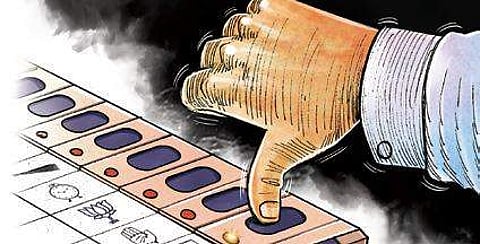

NEW DELHI: The Law Commission of India is unlikely to submit its final report on ‘One Nation One Poll’ before the winter session of Parliament, which begins on December 4, according to highly placed sources. The Law Commission, headed by Justice Ritu Raj Awasthi, is in the final stages of preparing its report on holding simultaneous elections to Lok Sabha and state assemblies across the country.
Former President Ram Nath Kovind’s had on Monday asserted that India should hold simultaneous parliamentary and state assembly polls, and that all political parties should support the idea. Kovind is the chairman of the eight-member high-level committee set up in September to examine the feasibility of holding simultaneous elections to Lok Sabha, state assemblies and local bodies. The Modi government’s move to set up the Kovind panel had kicked up a political storm with opposition parties alleging that the government may push the bill in Parliament. Most of the opposition parties are not in favour of ‘One Nation One Poll’. They claim it is an attack on the federal character of the nation.
In its first meeting with the Kovind panel on October 25, the Law Commission had submitted suggestions that included proposed changes to the Constitution for holding simultaneous elections in the country. “The Law Commission is yet to submit the final report on ‘One Nation One Poll’ to the high-level committee and it is in the last leg. It would not be submitted before the winter session of Parliament, which begins on December 4,” said the source. However, it is not clear if the government has plans to table the report during the interim Budget Session of Parliament in February if the panel submits its report by then. Voting for the 2024 general elections usually begins in April.
According to the source, the commission is deliberating on the proposed constitutional amendments as simultaneous polls would require tweaking of at least five articles of the Constitution. This includes Article 83 relating to the duration of Houses of Parliament; Article 85 relating to the dissolution of Lok Sabha by the President; Article 172 relating to the duration of the state legislatures; Article 174 relating to dissolution of the state legislatures, and Article 356 relating to the imposition of President’s Rule in states. “The commission has not consulted state governments on this,” said the official, adding that it is also looking at giving special powers to governors in extenuating circumstances.
This paper was the first to report that the Law Commission is likely to work out timelines for simultaneous polls for the 2024 and 2029 cycles. To synchronise Lok Sabha and assembly elections by 2029, the commission may propose to extend or curtail the tenures of respective state assemblies. Endorsing the idea, Kovind on Monday said that many committees including the parliamentary committee, Niti Aayog, Election Commission of India and others have said that the tradition of ‘One Nation One Election’ needs to be revived in the country. The members of the panel include Home Minister Amit Shah, NK Singh, Harish Salve and others.
Though Congress leader in Lok Sabha Adhir Ranjan Chowdhury was also named as a member, he had declined to be part of the committee saying that “it’s an eyewash”. The committee’s mandate involves examining and recommending specific amendments to the Constitution, the Representation of the People Act and any other laws and rules that would require amendments for holding simultaneous polls.
One of its terms of reference is to examine if constitutional amendments would have to be ratified by the state assemblies. It has been also asked to analyse and recommend possible solutions if there are scenarios like a hung house or defection.